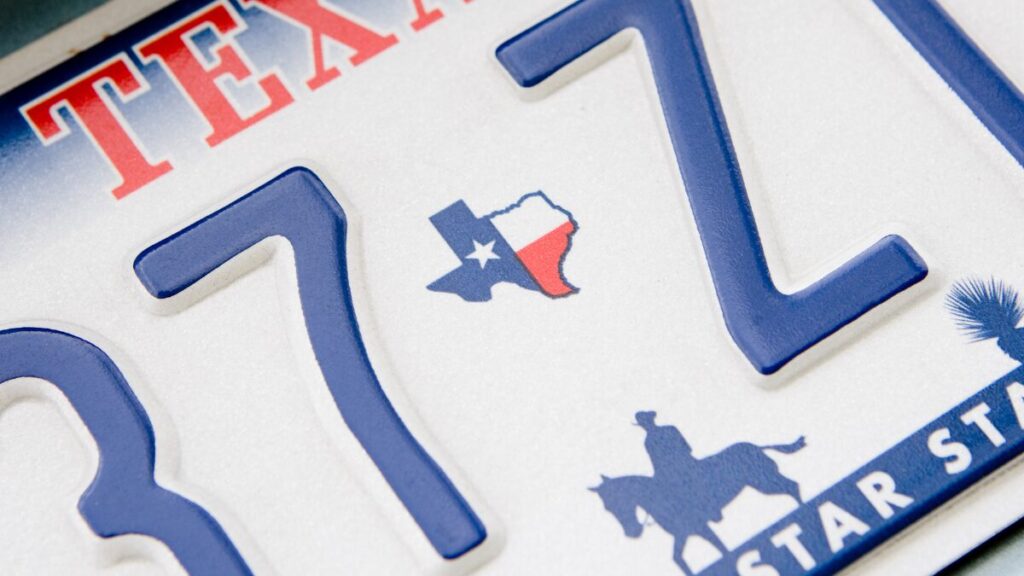Texas and South Dakota are popular choices for full-time RVers (as is Florida) looking to establish a domicile, but they offer different benefits. Choosing between them depends on individual preferences and needs.


For full-time RVers (people who live in a recreational vehicle all or most of the time), choosing a domicile is an important decision because it determines where they pay taxes, vote, and what state laws apply to them. They typically choose a state to register their vehicle, get insurance, and handle other legal matters, even if they don’t spend a significant amount of time in that state.
- What is a Domicile?
- Our Domicile Journey
- What Turned Us Off of South Dakota
- Why Texas Became Our New Choice
- The Texas RV Community and Lifestyle
- The Process of Changing Domicile to Texas
- Step 1: Establishing a Physical Address in Texas
- Step 2: Texas Vehicle Registration
- Step 3: Obtaining a Texas Driver’s License
- Step 4: Registering to Vote
- Step 5: Updating Insurance Policies
- Step 6: Filing Taxes with a Texas Address
- Step 7: Additional Legal Considerations
- Step 8: Establishing Community Ties
- Step 9: Documenting Your Move
- Conclusion
This post contains affiliate links. As a participant in Amazon Associates and various affiliate programs, we are compensated when qualifying purchases are made through our referral links at no additional cost to you. Full Disclosure
What is a Domicile?
Domicile refers to the place where a person has their permanent principal home to which they return or intend to return. In legal terms, it’s the place where a person has their fixed, permanent, and principal home for legal purposes. This concept is particularly important for various legal purposes, including taxation, voting, and asserting legal rights.
Unlike a residence, which can be any place where a person lives, a domicile has a more permanent connotation and involves an intention to remain there indefinitely. A person can have multiple residences (places where they live from time to time) but typically only one domicile at a time, which is considered their true, fixed, and permanent home.

Establishing a domicile involves more than just living in a place; it includes demonstrating an intention to make that place a permanent home. This can be shown through various actions, such as obtaining a driver’s license, registering to vote, buying property, or filing taxes in that location.
Our Domicile Journey
We investigated where we should domicile when we started our full-time RVing journey nearly five years ago. South Dakota seemed to make more sense at the time. The main advantage of using South Dakota was that there were no vehicle inspections needed, and you only had to be in the state one day to get residency. Also, South Dakota fell more in line with our first-year travels. We passed through the state early on our way to the east coast.

What Turned Us Off of South Dakota
The first issue we had with South Dakota wasn’t actually a problem with South Dakota it was a problem with Minnehaha County. Lisa received a Jury Summons in April 2022. She contacted the Minnehaha County court and told them we are full-time RVers and that we were out of state working in West Yellowstone, MT. She was told to put that info on the Jury Questionnaire and send it in. Lisa sent the form in and was excused from Jury Duty.
Two weeks following Lisa’s Jury Summons I received one of my own. I also filled out the Jury Questionnaire stating that we were full-time RVers working out of state. A letter just like Lisa’s exclusion had arrived at our mail service and I assumed I was excused also. But on May 31st I received an email from the Juror Notification System stating that I needed to check for changes to the Thursday Schedule. I didn’t understand why I was receiving an email if I was excused. I contacted our mail service and had the letter opened and scanned. Come to find out I was supposed to have reported to Jury Duty on May 30th.

I contacted the Jury Manager asking about the confusion. I asked why my wife was excused two weeks prior to my notice. She told me that there was a new judge and he was not allowing full-time RVers to be excused from Jury Duty for being out of the state and I would need to come back to South Dakota. I have no problem doing my civil duty but I’m not going to be forced to come back to the state at their whim.
The second issue that soured our taste for South Dakota was the state’s attack on voters. Both the House and Senate attempted to pass legislation to wipe out a full-time RVer’s ability to vote in the Mount Rushmore state. Neither bill passed but the thought that the state is attacking our voting rights put a bad taste in our mouths.

That was enough to send us searching for a better domicile. We felt that in the future South Dakota may continue to work against the full-time RVers they previously welcomed wholeheartedly.
Why Texas Became Our New Choice
After encountering challenges in South Dakota, we began exploring other options and Texas quickly emerged as the frontrunner. Switching our domicile to Texas has been a decision driven by a mix of practical benefits and a strong alignment with our lifestyle and values. We look forward to embracing all that the Lone Star State has to offer to the full-time RV community.
The main reason we chose Texas was that we had been in the state for a least a portion of every year of our nearly five years on the road. Something we weren’t doing with South Dakota or Florida. We really like Texas and have enjoyed our time in the state. Last winter we worked Gate Guarding in the Texas oil fields which gave us the ability to take the whole summer off and travel. We decided it made our RVing life better so we’ll continue to come back to the state in the winter to Gate Guard again.

Compared to many other states, Texas offers more affordable options for vehicle registration. This is particularly beneficial for RV owners, as registration costs can vary significantly from state to state. While we found that insurance on our RV and Jeep are higher in Texas we saved money on our registrations due to my VA Disability status.
Texas laws make it relatively easy to establish legal residency without owning a traditional home. This is particularly important for full-time RVers who don’t have a fixed sticks-and-bricks residence.
While not a legal or financial reason, Texas’ climate and diverse landscapes make it an attractive base for many RVers. You’ve got everything from beaches to mountains, along with a rich cultural and historical tapestry to explore.
The Texas RV Community and Lifestyle
Embracing the Texas RV lifestyle goes beyond the practicalities of domicile; it’s about becoming part of a vibrant, diverse community and exploring a state rich in culture, history, and natural beauty.

- Community Spirit: Texas hosts a supportive network of RVers, offering a wealth of knowledge, support, and friendship. Regular events and rallies further enrich this sense of community.
- Diverse Explorations: The state’s vast and varied landscapes invite endless adventures, from coastal shores to desert vistas. Historical sites and cultural landmarks add depth to the travel experience.
- Outdoor Recreation: With ample opportunities for activities like hiking, fishing, and kayaking, outdoor enthusiasts find Texas to be an ideal playground.
- Seasonal Flexibility: Texas is a year-round destination for RVers, including the ‘Winter Texans’ who enjoy its mild winters, adding a seasonal vibrancy to the RV community.
- Cultural Richness: The state’s unique culinary flavors, especially its barbecue and Tex-Mex cuisine, and thriving music and arts scene, offer a rich cultural experience.
The Texas RV lifestyle is about more than mobility—it’s about being part of a community that celebrates diversity, adventure, and the open road. Our experiences here have shown us that Texas is not just a domicile, but a place where culture, nature, and friendship converge to create a truly fulfilling way of life.
The Process of Changing Domicile to Texas
Establishing Texas as your new domicile requires completing certain legal and administrative steps. Here’s a guide to help full-time RVers like us navigate this process:
Step 1: Establishing a Physical Address in Texas
- Mail Forwarding Service: Sign up with a mail forwarding service in Texas. This service will provide you with a physical Texas address, which is essential for legal documentation. We use Escapees in Livingston, TX.
- Choosing the Right Service: Select a service that caters specifically to RVers and understands the nuances of domicile issues.
Step 2: Texas Vehicle Registration
- Registration Requirements: Bring your current registration, proof of insurance, and identification to a Texas County Tax Assessor-Collector’s office.
- Vehicle Inspection: If your RV or vehicle is in Texas, it must pass a Texas vehicle inspection before registration. Supposedly this requirement is going away in 2025.

Step 3: Obtaining a Texas Driver’s License
- Visit a DPS Office: Schedule a visit to a Texas Department of Public Safety (DPS) office.
- Required Documents: Bring identification, proof of Social Security number, proof of Texas residency (mail forwarding address), and your current driver’s license.
- Surrender Out-of-State License: You’ll need to surrender your current out-of-state driver’s license.
Step 4: Registering to Vote
- Voter Registration: While at the DPS office for your driver’s license, you can also register to vote in Texas.
- Alternative Methods: Alternatively, you can register to vote by mail or at various government offices.

Step 5: Updating Insurance Policies
- Vehicle and RV Insurance: Contact your insurance provider to update your vehicle and RV insurance policies to your new Texas address.
- Health Insurance: Review and update your health insurance plan as needed, considering Texas healthcare providers and networks.
Step 6: Filing Taxes with a Texas Address
- Inform the IRS: Update your address with the Internal Revenue Service (IRS) using Form 8822.
- State Tax Considerations: If you have income from other states, consult a tax advisor about how to handle state tax obligations.
Step 7: Additional Legal Considerations
- Legal Documents: Update your legal documents, including wills, powers of attorney, and healthcare directives, to reflect your new Texas domicile.
- Banking and Financial Accounts: Notify your bank and any financial institutions of your change of address.

Step 8: Establishing Community Ties
- Local Connections: Establish connections in your Texas community, such as joining local clubs, organizations, or churches.
- Physical Presence: Spend some time in Texas to further establish your ties to the state.
Step 9: Documenting Your Move
- Keep Records: Maintain records of all the steps you take to establish your domicile in Texas, including receipts, correspondence, and legal documents.
Conclusion
Switching our domicile to Texas has been a decision driven by a mix of practical benefits and a strong alignment with our lifestyle and values. We look forward to embracing all that the Lone Star State has to offer to the full-time RV community.
Changing your domicile to Texas is a multifaceted process that involves careful planning and attention to detail. By following these steps, full-time RVers can successfully transition their legal domicile to Texas, paving the way for a new chapter in their adventurous lifestyle.

Remember, choosing a domicile state is a personal decision and depends on your specific circumstances, including financial situation, travel plans, and personal preferences. But for many, Texas ticks a lot of the right boxes. What do you think? Does Texas align with your RV lifestyle needs and preferences?
If you’re looking to build your own home-based business like we have with this webpage, check out Wealthy Affiliate.
Wealthy Affiliate is an all-in-one platform that you can build your whole affiliate marketing business on. It combines training, software, and website hosting into one. This makes the whole process of starting an online business from scratch much easier, especially if you’re new to building a website.



